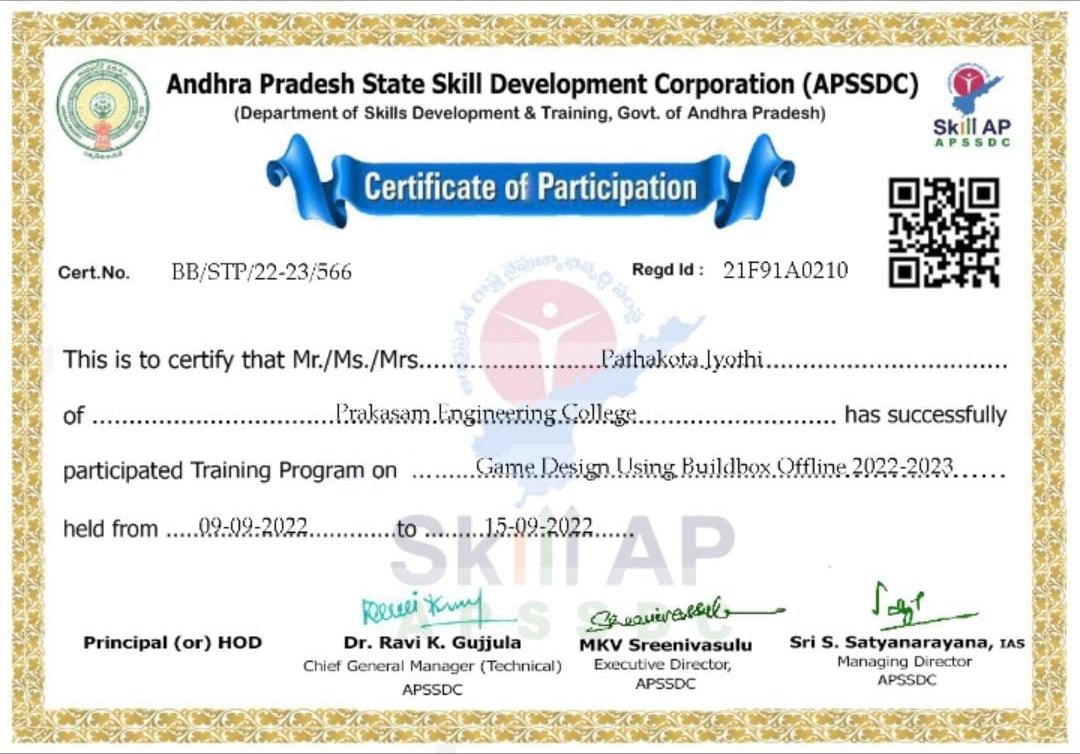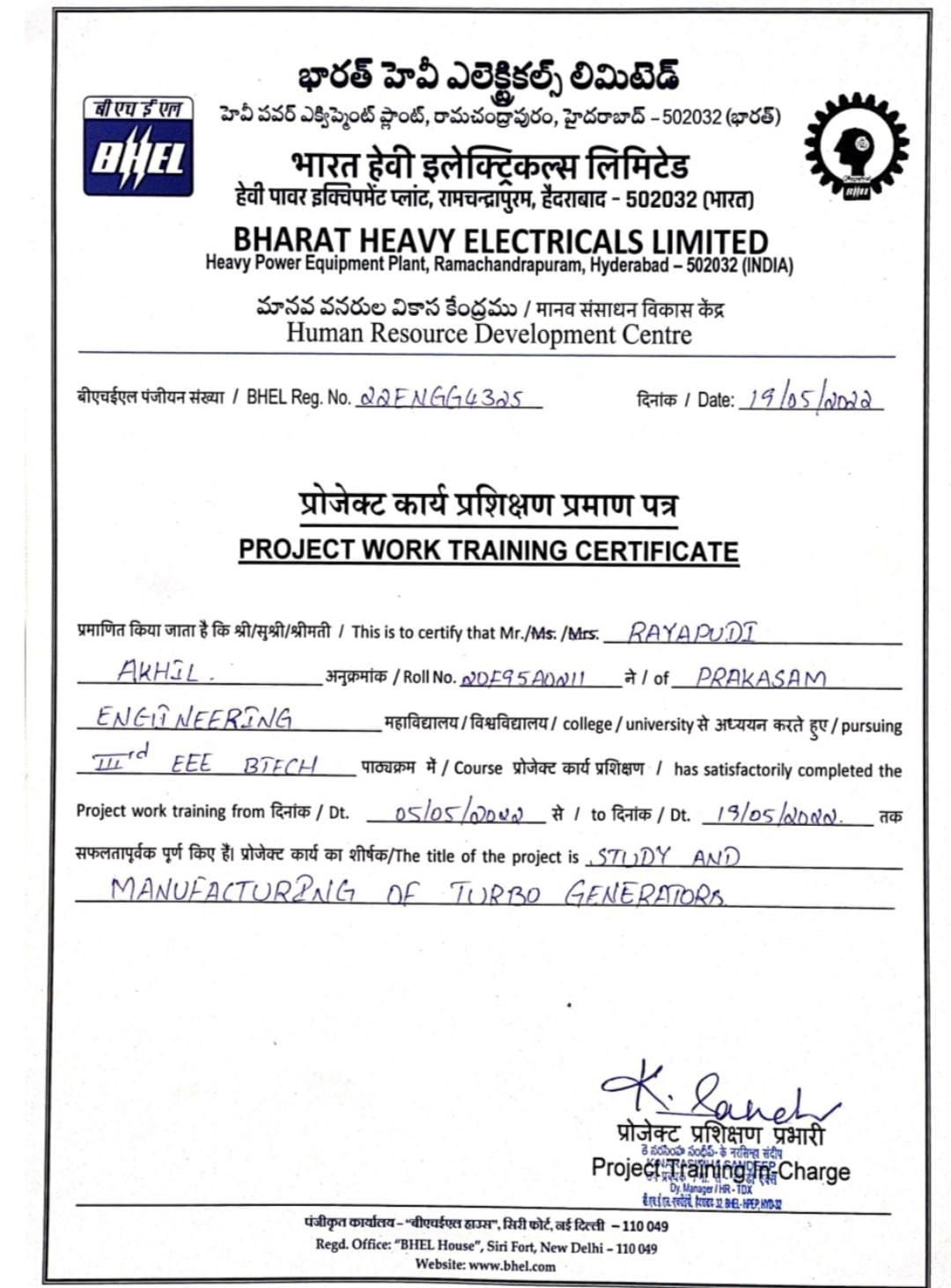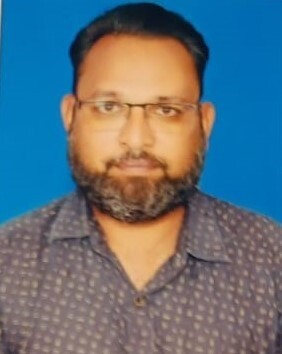Welcome to
Prakasam
Engineering College
Industrial Visit to the Adani Thermal Power Plant in Nellore, Andhra Pradesh in 2024
Industrial Visit to the VS Training & Services Ltd, Chennai, 2023
Industrial Visit to the 770 MW (7 x 110 MW) Srisailam Hydro Electric Project is constructed across the river Krishna, and a Power Station on the right side of the Damin 2022
Industrial Visit to Sri Damodaram Sanjeevaiah Thermal Power Station is located in Nelatur Village, near Krishnapatnam and 23 km from Nellore city of Andhra Pradesh in 2021
Industrial Visit to Sri Damodaram Sanjeevaiah Thermal Power Station is located in Nelatur Village, near Krishnapatnam and 23 km from Nellore city of Andhra Pradesh in 2019
Industrial Visit to Dr. Narla Tata Rao Thermal Power Station or Vijayawada Thermal Power Plant is located at Vijayawada in Andhra Pradesh in 2018
| PRAKASAM ENGINEERING COLLEGE | ||||
| EEE DEPARTMENT CERTIFICATIONS | ||||
| NUMBER | STUDENT | CERTIFICATION | YEAR | NAME OF THE COLLEGE OR INDUSTRY WHERE EVENT IS CONDUCTED |
| 20F91A0225 | M. JASWANTH | STUDY AND MANUFACTURE OF TURBO GENERATOR | 2022 | BHEL |
| 20F95A0207 | D. MAHESH BABU | STUDY AND MANUFACTURE OF TURBO GENERATOR | 2022 | BHEL |
| 20F95A0211 | R. AKHIL | STUDY AND MANUFACTURE OF TURBO GENERATOR | 2022 | BHEL |
| 21F91A0210 | PATHAKOTA JYOTHI | GAME DESIGNING USING BUILD BOX OFFLINE | 2022 | ANDHRA PRADESH STATE SKILL DEVELOPMENT CORPORATION |
| 21F91A0204 | KORRAKUTI BHAVANA | GAME DESIGN USING BUILD BOX OFFLINE | 2022 | PRAKASAM ENGINEERING COLLEGE |
| 21F91A0211 | DOKKA JAMEEMA | GAME DESIGN USING BUILD BOX OFFLINE | 2023 | PRAKASAM ENGINEERING COLLEGE |
| 21F91A0228 | KUMAVATH PAVAN KUMAR NAIK | GAME DESIGN USING BUILD BOX | 2022 | PRAKASAM ENGINEERING COLLEGE |
| 21F91A0232 | MUDDA RAJA | GAME DESIGNING USING BUILDBOX | 2022 | PRAKASAM ENGINEERING COLLEGE, KANDUKUR |
| 21F91A0250 | VANI PUTTA | DESIGNING OF SOLAR PV SYSTEM | 2023 | PRAKASAM ENGINEERING COLLEGE |
| 21F91A0249 | V.UMA MAHESWARI | GREEN ION ENERGY TECHNOLOGIES | 2023 | PRAKASAM ENGINEERING COLLEGE |
| 21F91A0215 | THALUPULA LAKSHMI PRIYA | GAME DESIGNING USING BUILDBOX | 2022 | PRAKASAM ENGINEERING COLLEGE |
| 21F91A0237 | G. SANDHYA | GAME DESIGN USING BUILDBOX OFFLINE | 2022 | ANDHRA PRADESH STATE SKILL DEVELOPMENT CORPORATION |
| 21F91A0225 | ATHAMAKURI ALEKHYA | DESIGNING OF SOLAR PANELS SYSTEM | 2023 | PRAKASAM ENGINEERING COLLEGE |
| 19F91A0207 | CHALLAVENKATA HARI KRISHNA | SIMENS CERTIFICATION PROJECT | 2021 | PRAKASAM ENGINEERING COLLEGE |


The Department of Electrical & Electronics Engineering was established in the year 2002 with an intake of 60 students and subsequently enhanced to 90 in the year 2004, and 120 in 2011 for B.Tech programme. The Department also offers M.Tech programme with specialization in Power Electronics from the academic year 2011 with an intake of 18 and Electrical Power Systems in 2013 with an intake of 18.
The department has made significant growth in terms of infrastructural and academic standards on par with other premier institutions in Andhra Pradesh. The department has well experienced professors with Ph.D and M.Tech qualifications, Associate and Assistant Professors with M.Tech qualification and maintains a faculty student ratio of 1:15 as per AICTE norms. The department has fully equipped laboratories/licensed softwares for UG and PG Programmes to impart practical knowledge to students who can take up any assignment after their graduation/post graduation. EEE department has taken main initiative in starting up the solar power plant in the college premises. The faculty provides total support to the student for taking part in securing government jobs. EEE alumni always finds available to the college when their presence is needed. Faculties are students' oriented and give top most priority to train students to secure job and get settled.

Dr. Meera Shareef Shaik
Associate Professor & H.O.D
15 years
| S.no | Name Of The Faculty | Achievements | Year |
| 1 | Meera Shareef Shaik | ||
| Completed PhD in Electrical Engineering from St. Peter’s Deemed to be University, Chennai | 2024 | ||
| Paper Publication- Indirect vector control for speed control of an induction motor using GA-PID | 2023 | ||
| Paper Publication - DESIGN SIMULATION OF MULTI-INPUT TRANSFORMER-COUPLED BIDIRECTIONAL DC-DC CONVERTER WITH ANN CONTROLLER | 2021 | ||
| Paper Publication - DESIGN SIMULATION OF MULTI-INPUT TRANSFORMER-COUPLED BIDIRECTIONAL DC-DC CONVERTER WITH ANN CONTROLLER | 2021 | ||
| Paper Publication - MODELING AND SIMULATION OF MPPT ALGORITHM FOR WIND ENERGY CONVERSION SYSTEM | 2021 | ||
| Paper Publication - Harmonic Reduction and PQ improvement in RES integrated Grid System using Hybrid Active Power Filters | 2020 | ||
| Paper Publication - Comparison of Artificial Controller Based MRAS Speed Observer for Field Oriented Control of Induction Motor | 2020 | ||
| Paper Publication - Review on Induction Motor Control Strategies with Various Converter and Inverter Topologies | 2020 | ||
| 2 | SK. Aarif | Paper Publication - Optimal Power Loss Index Evaluation Using Metaheuristic Optimization Algorithms in Radial Distributed Networks | 2023 |
| 3 | V. Hari Babu | ||
| Paper Publication - MODELLING AND SIMULATION OF MULTI RENEWABLE SOURCES WITH ENERGY MANAGEMENT FOR HIGH EFFICIENCY ACROSS THE MICROGRID | 2021 | ||
| Paper Publication - MODELLING AND SIMULATION OF MULTI RENEWABLE SOURCES WITH ENERGY MANAGEMENT FOR HIGH EFFICIENCY ACROSS THE MICROGRID | 2021 | ||
| Paper Publication - Harmonic Reduction and PQ improvement in RES integrated Grid System using Hybrid Active Power Filters | 2020 | ||
| 4 | P. Yedukondalu | Paper Publication - A NOVEL DESIGN OF HYBRID ENERGY STORAGE SYSTEM FOR ELECTRIC VEHICLES | 2021 |
| 5 | Shaik Nagul Meeravali | ||
| Paper Publication - MODELLING AND SIMULATION OF MULTI RENEWABLE SOURCES WITH ENERGY MANAGEMENT FOR HIGH EFFICIENCY ACROSS THE MICROGRID | 2021 | ||
| Paper Publication - PERFORMANCE ENHANCEMENT OF SINGLE PHASE GRID CONNECTED PV SYSTEM UNDER PARTIAL SHADING USING CASCADED MULTILEVEL CONVERTER | 2021 | ||
| Paper Publication - DESIGN AND SIMULATION OF SOLAR POWER HYBRID CIRCUIT FOR GRID ASSOCIATED WITH RECONFIGURABLE INVERTER TOPOLOGY | 2021 | ||
| 6 | PM Rupa | ||
| Paper Publication - DESIGN AND SIMULATION OF SOLAR POWER HYBRID CIRCUIT FOR GRID ASSOCIATED WITH RECONFIGURABLE INVERTER TOPOLOGY | 2021 | ||
| Paper Publication - A SCOPE OF INDUSTRIAL ROBOTIC AUTOMATION IN THE FOURTH INDUSTRIAL REVOLUTION | 2020 | ||
| 7 | J. Satish Babu | Paper Publication - Furnace Flame Tracking for Combustion Quality Estimation in Coal Fired Boilers | 2021 |
| 8 | I. Sreedevi | Paper Publication - Harmonic Reduction and PQ improvement in RES integrated Grid System using Hybrid Active Power Filters | 2020 |
| S.No | Name of the Student | Achievements | Year | Prize |
| 1 | K. Mounisha Chowdary | Qualified in TOEFL | 2023 | Qualified |
| 2 | K. Sai Kumar Reddy | National Level technical Symposium VISVOSTAV 2K23 for PROJECT EXPO at PBRVITS, Kavali | 2023 | 1st Prize |
| 3 | D. Suneel Kumar | National Level technical Symposium VISVOSTAV 2K23 for PROJECT EXPO at PBRVITS, Kavali | 2023 | 1st Prize |
| 4 | P. Spandana Chowdary | National Level technical Symposium VISVOSTAV 2K23 for PROJECT EXPO at PBRVITS, Kavali | 2023 | 2nd Prize |
| 5 | K. Sree Lakshmi | National Level technical Symposium VISVOSTAV 2K23 for PROJECT EXPO at PBRVITS, Kavali | 2023 | 3rd Prize |
| 6 | K. Mounisha Chowdary | 2-day national level techno fest RISE RADIANCE 2023 for PAPER PRESENTATATION at RISE, Ongole | 2023 | 1st Prize |
| 7 | P. Ravindra Vyas | National Level Stem Fest Srujana 2k23 for PROJECT EXPO at PACE, Ongole | 2023 | 2nd Prize |
| 8 | B. Prasanna | National Level Stem Fest Srujana 2k23 for PAPER PRESENTATION at PACE, Ongole | 2023 | 2nd Prize |
| 9 | K. Mounisha Chowdary | National Level technical Symposium VISVOSTAV 2K23 for PAPER PRESENTATION at PBRVITS, Kavali | 2023 | 2nd Prize |
| 10 | P. Sowjanya | National Level technical Symposium VISVOSTAV 2K23 for PAPER POSTER DESIGN at PBRVITS, Kavali | 2023 | 2nd Prize |
| 11 | P. Neelima | National Level Stem Fest Srujana 2k23 for JAAM at PACE, Ongole | 2023 | 3rd Prize |
| 12 | P. Suresh | National Level Stem Fest Srujana 2k23 for PAPER PRESENTATION at PACE, Ongole | 2023 | 3rd Prize |
| 13 | B. Naga Lakshmi | National Level Stem Fest Srujana 2k23 for PAPER PRESENTATION at PACE, Ongole | 2023 | 3rd Prize |
| 14 | G.V. Sravani | National Level technical Symposium VISVOSTAV 2K23 for PAPER POSTER DESIGN at PBRVITS, Kavali | 2023 | 3rd Prize |
| 15 | G. Venkata Mahendra | Qualified in APPGECET | 2023 | Qualified |
| 16 | Chatla Siva Nagi Reddy | Qualified in GATE and HAL | 2022 | Qualified |
| 17 | Naveen Magam | Qualified in TOEFL | 2021 | Qualified |
| 18 | Sravya Makkena | Qualified in GRE TOFEL | 2021 | Qualified |
| 19 | Venkata Naga Sai Manikanta | Qualified in GRE | 2021 | Qualified |
| 20 | V. Alluraiah | Qualified in GRE | 2020 | Qualified |
| 21 | SA Shanthi Priya | APPGECT | 2020 | Qualified |
| 22 | Nagi Reddy Siva | Qualified in DUOLINGO ENGLISH TEST | 2020 | Qualified |
| 23 | Malydri Sivarapu | Qualified in PGECET | 2019 | Qualified |
| 24 | Mounika Somineni | Qualified in PGECET | 2019 | Qualified |
| 25 | Mounika Suram | Qualified in PGECET | 2019 | Qualified |
| 26 | Sowjanya Tanguturi | Qualified in PGECET | 2019 | Qualified |
| 27 | Boyina Guru Seshu | Qualified in PGECET | 2019 | Qualified |
| 28 | Mumidi Satish | Two-day national level technical symposium AMPHEROZ22 at AAA CET, Sivakasi | 2022 | 3rd Prize |
| 29 | Y. Rangamma | National Level Symposium SRUJANA 2k21 for GENEREAL QUIZ at Geetanjali Inst of Science and technology, Nellore | 2021 | 2nd Prize |
| 30 | V. Seeta Maha Lakshmi | National Level Symposium SRUJANA 2k21 for PAPER PRESENTATION at Geetanjali Inst of Science and technology, Nellore | 2021 | 2nd Prize |
| 31 | Y. Rangamma | National Level Symposium SRUJANA 2k21 for QUIZ at Geetanjali Inst of Science and technology, Nellore | 2021 | 1st Prize |
| 32 | T. Siva Parvathi | National Level technical Symposium VISVOSTAV 2K22 for PROJECT EXPO at PBRVITS, Kavali | 2022 | 2nd Prize |
| 33 | P. Spandana Chowdary | National Level Symposium SRUJANA 2k21 for PAPER BATTERY at Geetanjali Inst of Science and technology, Nellore | 2021 | 1st Prize |
| ROLL NO | NAME OF THE STUDENT | PERCENTAGE | RANK |
| 20F91A0211 | D. PUJITHA | 84.30 | 1 |
| 20F91A0226 | M. SRILEKHA | 84.30 | 2 |
| 20F91A0238 | P. SPANDANA | 83.30 | 3 |
| ROLL NO | NAME OF THE STUDENT | PERCENTAGE | RANK |
| 19F91A0208 | MOUNISHA CHOWDARY KUKKAPALLI | 64.40 | 1 |
| 19F91A0218 | SAI PRASANNA KATRELA | 61.45 | 2 |
| 19F91A0215 | PUJITHA GUDAPATI | 60.12 | 3 |
| ROLL NO | NAME OF THE STUDENT | PERCENTAGE | RANK |
| 19F95A0203 | SWATHI PUSAPATI | 72.88 | 1 |
| 18F91A0249 | TRIVENI TANNERU | 71.89 | 2 |
| 18F91A0238 | SANDHYA UPPUTHOLLA | 70.50 | 3 |
| ROLL NO | NAME OF THE STUDENT | PERCENTAGE | RANK |
| 17F91A0209 | KAVITHA MUTHALURI | 74.17 | 1 |
| 17F91A0220 | MOUNIKA DIVI | 73.00 | 2 |
| 17F91A0222 | NAVYA LIKHITHA VEMURI | 70.94 | 3 |
| ROLL NO | NAME OF THE STUDENT | PERCENTAGE | RANK |
| 16F91A0228 | MANOGNA D | 83.00 | 1 |
| 16F91A0252 | SHARMILA SK | 80.28 | 2 |
| 16F91A0250 | SHABANA SK | 80.17 | 3 |
| ROLL NO | NAME OF THE STUDENT | PERCENTAGE | RANK |
| 15F91A0239 | SUSMITHA GARNIPUDI | 81.26 | 1 |
| 15F91A0217 | MOUNIKA SURAM | 80.14 | 2 |
| 16F95A0206 | MAREBOINA RAVITEJA | 79.30 | 3 |
| ROLL NO | NAME OF THE STUDENT | PERCENTAGE | RANK |
| 14F91A0207 | ASHOK KUMAR CHERUKURI | 84.56 | 1 |
| 14F91A0258 | RASOOL VEEPANAGANDLA | 83.10 | 2 |
| 14F91A0235 | NAGARAJU ETIKALA | 81.04 | 3 |
| ROLL NO | NAME OF THE STUDENT | PERCENTAGE | RANK |
| 13F91A0220 | HARIKRISHNA M | 80.66 | 1 |
| 13F91A0223 | INDUSAI T | 80.31 | 2 |
| 13F91A0216 | DHRUVITANANDA TADIPARTHI | 78.95 | 3 |
| ROLL NO | NAME OF THE STUDENT | PERCENTAGE | RANK |
| 12F91A0202 | ALEKHYA CH | 83.25 | 1 |
| 12F91A0203 | AMANI K | 81.12 | 2 |
| 12F91A0234 | PRASANNA G | 80.83 | 3 |
| ROLL NO | NAME OF THE STUDENT | PERCENTAGE | RANK |
| 11F91A0250 | MANEESHA S | 82.69 | 1 |
| 11F91A0259 | NAGAJYOTHI G | 82.37 | 2 |
| 11F91A0274 | RAJESH N | 81.76 | 3 |
| ROLL NO | NAME OF THE STUDENT | PERCENTAGE | RANK |
| 10F91A0245 | PUJITHA N | 83.49 | 1 |
| 10F91A0280 | UPPENDRA N | 82.56 | 2 |
| 10F91A0259 | SASIKALA B | 82.10 | 3 |
| S. No | Name of the Faculty | Designation |
| 1 | Dr. SK.MEERA SHAREEF | ASSOCIATE PROFESSOR |
| 2 | Mr.V.HARIBABU | ASSOCIATE PROFESSOR |
| 3 | Mr.SK.NAGULA MEERAVALI | ASSOCIATE PROFESSOR |
| 4 | Mr.P.YEDUKONDALU | ASST PROFESSOR |
| 5 | Ms.P.MASTAN RUPA | ASST PROFESSOR |
| 6 | Mr.SK.AARIF | ASST PROFESSOR |
| 7 | Ms.I.SRIDEVI | ASST PROFESSOR |
| 8 | Mr.K.V.RAMAKRISHNA | ASST PROFESSOR |
| 9 | Mr. J.SATISH BABU | ASST PROFESSOR |
| 10 | Mr.J.ALLA BAGASH | ASSOCIATE PROFESSOR |
| 11 | Mr. B. GURUSESHU | ASST PROFESSOR |
| 12 | Mrs. SK.NOUSHIN | ASST PROFESSOR |